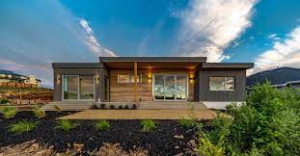The Pros and Cons of Modular Homes
Modular and relocatable homes carry with them a particular set of pros and cons. What are the advantages and disadvantages of building a modular portable house?
Let’s discuss these points in detail, starting with the pros.
The Pros of Modular Homes
Modular Relocatable Homes are Cheaper

The price is probably one of the biggest advantages of building modular homes. Since the parts of relocatable homes for sale are pre-designed and constructed, manufacturers are able to acquire the materials in bulk, which means lower production costs, and that in turn spells lower prices for the buyers. Another way you could save money is through rent: the sooner you can move into your new home, the more you’ll save on rent. Lastly, since the entire construction process takes place in a manufacturing facility, there’s no need to spend money on construction tents/living quarters for the builders.
It’s Faster to Build Modular Relocatable Homes
For traditional stick-built homes, preparing the site and the foundation is a prerequisite to the house construction. For modular relocatable homes, these stages can be completed simultaneously since the home building is done somewhere else. Another contributing factor is that the weather has no bearing on the continuity of the project: rain or shine, summer or snow, the work on a modular home continues. The entire process is easier on the workers too, since they won’t be subjected to adverse weather conditions for extended periods of time.
Modular Relocatable Homes are More Sustainable

Since relocatable homes are prefabricated, everything is pre-measured and cut to size. According to the Australian Bureau of Statistics, construction waste accounts for around 16.8% of all solid waste that ends up in landfills (around 12.7 million tonnes). If you’re looking to make environmentally sound choices in the process of building your dream house, a modular or demountable home might be your best bet. Some builders will even allow you to choose sustainable and energy-efficient (in terms of thermoregulation) materials and designs for your home!
You Can Ensure the Quality of Modular Relocatable Homes
Modular homes are growing in popularity. It’s been estimated that by 2027, 1 in 10 homes in Australia will be modular, which could change the face of the housing industry. To find out more see the link below🏠 https://t.co/qYQHdoNj7i pic.twitter.com/QSO5Lalyes
— Rate Comparison (@RateComparison) May 23, 2019
Since the house has been pre-designed, it is possible for aspiring homeowners to examine every component of their dream relocatable home. Contrary to popular opinion, modular homes can be customized according to your specifications, from 2-bedroom portable homes to loft-style flats!
Since stick-built homes are exposed to the elements, the materials are prone to rust, mould, and mildew. On the other hand, every part of a modular relocatable home is built securely indoors in a factory setting so there’s less damage to the materials and the tools. That takes us to the next point.
Modular and Relocatable Homes are Designed to be Durable
Since modular and relocatable homes are designed to withstand harsh transport and assembly requirements (highspeed highways, cranes, and the setting up process are no joke), you can trust that every section of your future portable home can survive a lot of challenges that nature throws its way.
Modular Relocatable Homes are Readily Extendable
Another great thing about modular relocatable homes is that they’re designed to be extendable. While stick-built renovations and additions require an entirely new set of planning and building, modular homes are designed to be extendable. That’s an amazing point for people and families that need a home that will grow and expand as their needs and requirements change.
The Cons of Modular Homes
Modular Homes Have Limited Financing Options

Since portable modular homes are technically built someplace else, lenders are a bit wary about funding. Some banks don’t even have a category wherein modular homes fit in! If you’ve been thinking about taking out a loan to finance your housing needs, you might have to talk to lenders about modular houses and take extra care when choosing the builders that you’ll be working with, since some lenders also look at the track record of the construction company that will be working on the projects.
Housing Regulations are Trickier for Modular Relocatable Homes
Since modular and moveable homes are alternative housing set ups, the permits required to build might vary by state and territory. You need to spend a bit more time researching about this, and of course, you have to work with a construction company that is knowledgeable about the particular regulations in your area.
Modular Relocatable Homes Need to Be Transported Carefully and Efficiently
Distance, cost, and safety are three things to be considered when it comes to transporting your prefabricated home. Depending on where the permanent site is, there could be costs related to travel permit acquisition, and as well as a host of other transportation concerns that could pose some issues. Again, this is something that your builder can help you with!
Setting Up the Modular Home’s Utilities Might be Your Responsibility
Depending on your modular or relocatable home’s permanent location, electricity, water, plumbing, and sewerage might require significant work on your part.
Is a Modular Relocatable Home a Good Investment?

While it’s true that modular homes are not as “established” as traditional stick-built homes so they’re a bit more difficult to resell, modular relocatable homes can provide you with amazing rental opportunities as well. It really boils down to what you value!
Modular homes are an amazing alternative to the whole traditional stick-built homes, especially to people who find value in the pros we have discussed here. People who are looking to spend less, move in quicker and ensure the quality of their dream home will find modular and relocatable home options definitely worth exploring!
If you think that a modular home suits your preferences, priorities, and needs, don’t hesitate to reach out! Let’s turn your dream home into a reality.
One thought on “The Pros and Cons of Modular Homes”
Comments are closed.




Kit Home vs. Modular Home: Which Type of Home Suits You? - Stunning Tiny Homes and Modulars
[…] modular home is a ready-to-move building. Modular homes are constructed in the factory and then delivered to […]
October 16, 2021